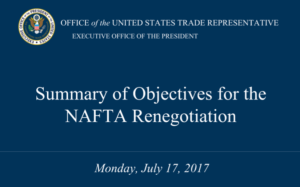 Yesterday, the USTR released the awaited (eighteen-page) document outlining its negotiating objectives for when — in thirty days — the U.S. is at the table with Mexico and Canada, to redo NAFTA. You can see the USTR’s document here. Our petition for telling the President and Congress that Trump’s plan falls short, to the point of being unacceptable, is here, and please submit your name. Also, find Citizens Trade Campaign’s statement in response to the release, on their site, here.
Yesterday, the USTR released the awaited (eighteen-page) document outlining its negotiating objectives for when — in thirty days — the U.S. is at the table with Mexico and Canada, to redo NAFTA. You can see the USTR’s document here. Our petition for telling the President and Congress that Trump’s plan falls short, to the point of being unacceptable, is here, and please submit your name. Also, find Citizens Trade Campaign’s statement in response to the release, on their site, here.
The Trump administration continually signals to us that it has a values problem and a competence problem. Trump’s politics are not working people’s values. And the blame that he cast during the campaign for folks’ economic hardship was leveled at Mexico, and others, who are getting a better “deal” than we are, supposedly. Trump’s story of grievance missed the mark of an authentic critique of NAFTA.
He is a con-man on trade (at least, so far). The TPP and NAFTA to Donald-Trump-the-Candidate were unacceptable, disastrous deals. Yet given the chance to renegotiate NAFTA, the Trump administration has inserted TPP language in the NAFTA objectives. The new NAFTA negotiating objectives are not an improvement over TPP on labor and environment — the provisions there in TPP having been rejected as inadequate by us (and civil society broadly).
Human rights as an objective is not in the administration’s document, which is a step backward from Congress’s 2015 Trade Promotion Authority bill, which chanced to use the phrase in one place. Congress’s 2015 Trade Promotion Authority bill passed; it is what we are living under (and it is commonly known as the Fast Track rules) and it was originally the table-setter, procedurally, for the TPP (and other trade agreements to follow). (So, Trump’s “new” NAFTA is literally more of the same.)
The administration’s release is vague. It is specific only in one place: in its pushing for the elimination of NAFTA’s Chapter 19, which instituted review panels to help enforce anti-dumping. The fact that the removal of a chapter was mentioned, but it was not NAFTA’s Chapter 11, is a serious point. It means Trump’s intent is to keep the ISDS system in place, whereby corporations can sue governments if the governments have laws on the books that the corporations perceive block their profit-making.
In total, Trump here presents a plan ripe for corporate expansionism and not a deal that was demanded by (and, in a sense promised to) working families. It is unoriginal, it is business-as-usual, and it is not welcome news for those of us taking a firm stance for people and planet. There will need to be — now more than ever — real transparency in this process, and people waking up to Trump’s hollowness in his promises to make things “a lot better.”
Our petition demands transparency, in addition to insisting on seeing people’s real needs put ahead of corporate designs.
